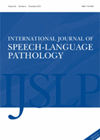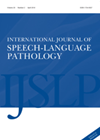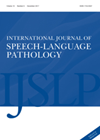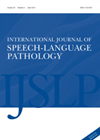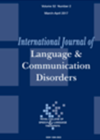
Journal Reviews
A song for my future self
People with aphasia experience a loss of friendships and social networks and, with this, a loss of identity. Interventions targeting participation, social and emotional wellbeing for people with aphasia have received more attention in the research literature. Storytelling is a...
Nothing about us without us: a how-to guide
Participatory design is an approach that is built around collaboration with users through a process of coproduction, design and creation. Most interventions are designed with the expert clinician researcher as the starting point, who looks at theory, evidence and their...
Swallowing it whole: the physical and psychological consequences of dysphagia
Living with dysphagia in the real world can be extremely challenging, both practically and psychologically. Long-term changes in taste due to chemo-radiation treatment for head and neck cancer, fatigue due to Parkinson’s disease, and physically impaired structures due to stroke...
How long is too long? Waiting times for speech and language therapy
Waiting lists are a reality of clinical practice, and many health and social care professionals become used to having to cope with this. The authors of this paper addressed this issue by examining written submissions to the 2014 Senate Inquiry...
Doing it for the people: how to do speech and language therapy
This review article distils 58 studies, collating information from people with aphasia, their families and clinical speech and language therapists summarising the seven habits of highly effective aphasia therapists. Habit 1: Effective therapists invest time in and prioritise relationships with...
PACT or Partners of Aphasic Clients Conversation Training
There is an increasing recognition that families and caregivers of patients require special training to manage their wards. PACT or Partners of aphasic patients Conversation Training is an initiative which aims to improve awareness of methods of communicating with aphasic...
Difficult consultations with HPV-positive oropharnyeal cancer patients
The aetiological role of human papillomavirus (HPV) in oropharyngeal squamous cell carcinoma (OPSCC) is well established, and its incidence has massively increased over the last decade, whilst the incidence of HPV-negative OPSCC is declining. Although we know that HPV-positive OPSCC...

